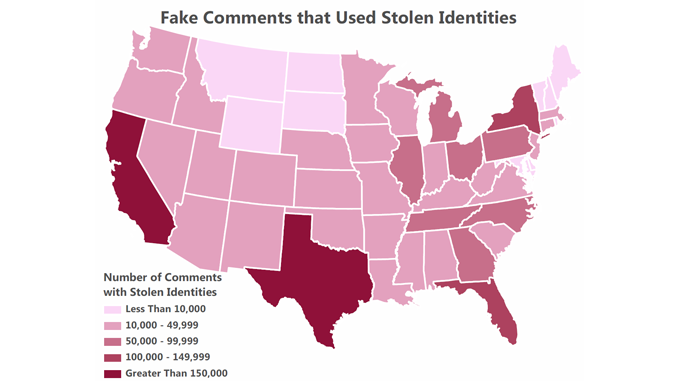
“One 369-word comment supporting Obama-era net-neutrality rules was posted on the FCC website more than 300,000 times.”
“A comment from “Elzor The Blarghmaster … was among the 818,000 identical comments backing the Trump policy.”
In September, TNB ICYMI News told readers about the New York Times was suing the FCC “for records the newspaper alleges may reveal possible government interference in a public comment period before the commission rolled back Obama-era net neutrality rules.”
ARS Technica reported the story as a series of back and forth between the NYT and the FCC resulting in the NYT suing in New York’s Southern District Court.
The Times made a Freedom of Information Act (FoIA) request in June 2017 for FCC server logs related to the system for accepting public comments on FCC Chairman Ajit Pai’s repeal of net neutrality rules. The FCC refused to provide the records, telling the Times that doing so would jeopardize the privacy of commenters and the effectiveness of the agency’s IT security practices and that fulfilling the records request would be overly burdensome.
This led to a months-long process in which the Times repeatedly narrowed its public records request in order to overcome the FCC’s various objections. But the FCC still refuses to release any of the records requested by the Times, so the newspaper sued the commission yesterday in US District Court for the Southern District of New York.
ARS Technica; Sept 21 2018
The law suit alleges the FCC hid records of their net-neutrality comments, breaking the law.
Last year the Wall Street Journal posted an in-depth investigative report saying they had “uncovered thousands of fraudulent posts on agencies’ dockets, in hot-button areas such as net neutrality and payday lending.”
The Wall Street Journal has uncovered thousands of other fraudulent comments on regulatory dockets at federal agencies, some using what appear to be stolen identities posted by computers programmed to pile comments onto the dockets.
Reports earlier this year of fraudulent comments on the FCC docket prompted the Journal to investigate the phenomenon there and at other federal agencies. After sending surveys to nearly 1 million people—predominantly from the FCC docket—the Journal found a much wider problem than previously reported, including nearly 7,800 people who told the Journal comments posted on federal dockets in their names were fakes.
Wall Street Journal; Dec 12 2018
A comment from Donna Duthie was filed with the FCC “calling the old Obama-era policy an “exploitation of the open Internet” on June 2. “Ms. Duthie died twelve years ago.”
In December of last year ARS Technica reported an investigation was announced by former NY Attorney General Eric Schneiderman saying, at that time, 2 million comments posted to the FCC’s comment section “were filed using stolen identities,” some of them dead people. He set up a website so people could search names “to determine if they’ve been impersonated,” adding, “so far, over 5,000 people have filed reports.”

Now, on Tuesday, WSJ reported that NY Attorney General Barbara Underwood has continued that investigation, deepening the probe in an effort to determine who has been behind the “millions of comments sent using the names of real people who didn’t authorize them,” and now has subpoenaed “more than a dozen advocacy groups, lobbying firms and consultants” in the investigation, adding that, up-to-date, the AG’s office has “found up to 9.5 million comments that appear to have been filed using the names and addresses of real people who had no idea they were being cited in the comments filed with the Federal Communications Commission over its proposal to scale back its regulation of the internet.”
The New York investigation is one of the first official probes into lobbying firms that promise special interests they can deliver thousands, even millions of people to back their causes under consideration before the government. The sector is sometimes called “AstroTurf lobbying” for generating artificial grass-roots support.
Wall Street Journal; Oct 16 2018
But it is not just for the contentious FCC comment section on the [now] rolled-back regulatory rules where this was, and is, happening. In the WSJ investigative report last year, they found, and heard from, “people reporting fraudulent postings under their names and email addresses” from the Consumer Financial Protection Bureau, the Federal Energy Regulatory Commission and the Securities and Exchange Commission.
Nor is it just one-sided. Thousands of fraudulent names and email addresses that favored both “antiregulation stances but also comments mirroring consumer-groups’ pro-regulation talking points” were posted in people’s names without their permission.
According to a Gizmodo report Tuesday, a Stanford University study was posted this month by researcher Ryan Singel, titled, Filtering Out the Bot: What Americans Actually Told the FCC about Net Neutrality Repeal – “A state-by-state, district-by-district look at linguistically unique comments filed to the FCC in the 2017 repeal proceedings.”
He used a machine learning program to weed out the millions of comments that were fakes and duplicates—as the duplicated messages were almost certainly part of a form letter campaign.
After he filtered out those submissions, he was left with about 800,000 unique comments. Out of all those comments only 0.3 percent supported the repeal of net neutrality.
Singel found that not only were the unique comments overwhelmingly supportive of net neutrality—the statements “showed a nuanced understanding” of net neutrality policy, meaning “commenters grasp the issue.”
Gizmodo; Oct 16 2016
According to Singel’s study “he also found that many comments came from rural areas and Republican districts,” and that they also came from districts “that had “toss-up races,” which may suggest, Gizmodo writes, that opinions the public have on net neutrality “could have a major influence [on] the midterm elections.”
On A Side Note (Opinion)
We’ll file all this under things to watch. Stay tuned.
